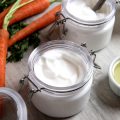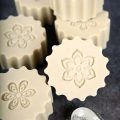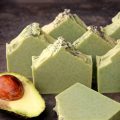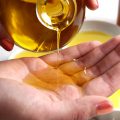Aromatherapy & Pregnancy : The History of Warnings
Since I’m 4 1/2 months pregnant, of course I’m more careful than ever with soapmaking, fragrance oils and essential oils. Given some of the scary warnings about essential oils (and my proximity to them daily), I went to my friend and aromatherapist Kayla Fioravanti to get some advice. She kindly wrote the guest blog below about aromatherapy and pregnancy. In aromatherapy the use of essential oils during pregnancy remains a contentious subject debated by many in the industry. We get asked about aromatherapy in pregnancy most commonly by those who become pregnant while running their own soap, aromatherapy, spa or personal care product line.
From Aromatherapist to Aromatherapist you may get varying answers when it comes to prenatal aromatherapy. Some believe that essential oils should be completely avoided during the first trimester and others believe they should be avoided all together and then there are others that don’t avoid them at all. I, personally, worked as an Aromatherapist through two of my three pregnancies. I handled, blended and manufactured using essential oils on a daily basis with no ill-effects on my pregnancy or babies. I also used aromatherapy for massage, and baths to treat my stress, body aches, fatigue, morning sickness and labor successfully. To confidently use aromatherapy in pregnancy it is vital to understand the root of aromatherapy warnings and contraindications.
The fears surrounding aromatherapy in pregnancy are found in historical cases in which essential oils were misused purposefully or accidently. All of the cases of adverse reactions in pregnancy are related to women drinking large doses of essential oils. Any responsible Aromatherapist would never suggest that essential oils should be consumed. In reality essential oils no matter what the circumstances are should never be taken orally.
Aromatherapists all warn their clients away from pennyroyal essential oil due to a case in the USA in which a woman drank a large dose of pennyroyal in order to induce an abortion that proved fatal to her (Gold and Cates, 1980). One out of four cases in which pregnant women accidently drank Camphor oil instead of Castor oil resulted in the death of the baby (Weiss and Catalano, 1976).
There has never been a reported case of a woman or baby being harmed by topical or inhalation therapy used during pregnancy or labor. Another reported cases in which pennyroyal and parsley seed were taken in large doses caused hepatotoxicty which resulted in the death of the baby. There are two other case in which women consumed the same large doses of pennyroyal (100 to 200 times the recommended topical application) in which both the mothers and the babies survived unharmed.
It is cases like this that give essential oils warning and contraindications.
Worldwide a large number of midwives and nurses have become Certified and/or Registered Aromatherapist over the past ten years. Aromatherapy in the labor and delivery room has been a common practice in England since 1987. After 22 years of regular use of aromatherapy by midwives and nurses in England one would think that by now if topical and inhalation usage of essential oils was dangerous during pregnancy there would be a case reported by now, but there have been none.
The most recent case of a pregnant woman consuming essential oils resulted in a midwife losing her job and license, but no harm to the mother or baby. In North Wales, midwife Sandra Hughes who was trained in aromatherapy mixed some sweet almond oil with two drops of lavender and one drop of lime in a plastic cup and left it by her patient’s bedside. Her intention for it to be massage onto the patient but after a mix up while she was out of the room the patient drank the blend. The mother and baby were monitored but suffered no ill effects. Communication and proper application of essential oils is vital.
In reality essential oils have been used by pregnant women for thousands of years safely. Most perfumes on the market use essentials oils or components of essential oils combined with synthetic fragrance chemicals. Yet you never see a warning on perfume bottles to avoid during pregnancy. Chemical components of essential oils have historically been used in the production of fragrance oils as well and have caused no ill effects during pregnancy. For instance, nutmeg essential oil is one of the ingredients used to make Green Tea fragrance oil. Below you will find nutmeg on the “essential oils to avoid during the first trimester” list, however, it is a component of a common fragrance oil that pregnant women use every day all over the world with no ill effects.
You will find that the aromatherapy field, in general, has chosen to err on the side of caution.
Be aware that during pregnancy a woman has a heightened sense of smell. Always use half dose of essential oils for pregnant women. The highest percentage of essential oil in aromatherapy products for pregnant women is 2%. Be completely in-tune with what essential oils she finds repulsive or dislikes during pregnancy. I have found that most pregnant women find essential oils that are highly hormonal distasteful during the first trimester of pregnancy. My theory is that her body warning her away from essential oils with properties that it does not need at a given time. I have also found that women crave and adore highly hormonal essential oils when they have PMS or are going through menopause. It is as if the nose if leading her to oils that it needs at a given time in her life.
There is no documentation on whether or not essential oils pass through the placenta but because they have low molecular weights and are negatively charged molecules it is feasible to assume that they do. The placenta acts a barrier to positively charge molecules but negatively charged molecules do cross the placenta (Maickel & Snodgrass 1973) which makes choosing the right essential oils used during pregnancy vital.
For instance, savin and Spanish sage could be extremely detrimental during pregnancy. They are not common essential oils used aromatherapy; however, they are a good example of why precaution is used by Aromatherapists. Savin (Juniperus savina) and Spanish sage (Salvia lavandulifolia) essential oils contain the compound sabinyl acetate which has been proven to have a teratogenic effect (ability to interfere with normal embryonic development) in laboratory animals (Guba 2002).
Many essential oils are believed to have emmenagogic actions (cause uterine contractions believed to induce menstrual cycle) and are believed to be dangerous to use during pregnancy. However, many Aromatherapists believe that emmenagogic actions are not enough to affect a stable pregnancy. The controversy lies in the history of a pregnant woman. If a woman has had miscarriages in the past it is always best to err on the side of caution and avoid emmenagogic essential oils.
When buying essential oils always cross check them by using their Latin nomenclature in combination with the common name. This will ensure consistency and above all safety. It is critically important to know the difference between various essential oils, for instance, clary sage is very helpful in labor yet sage is contraindicated for pregnancy. Aromatherapists use Latin nomenclature to identify essential oils for that very reason. For instance, clary sage is Salvia sclarea and Salvia officinalis is sage. Using both names to identify and crosscheck your essential oil choices is the best practice to protect your business.
The safest essential oils to use in pregnancy are the citrus essential oils including; bergamot, lemon, lime, sweet orange, mandarin, grapefruit and tangerine. They all such low molecular weights that they disperse into the air shortly after application. There are no contraindications, no safety data and no warnings that are related in any way to pregnancy.
Occasionally you might find them on a list of essential oils to avoid during pregnancy but that is only when the Aromatherapist has taken every essential oil with a warning and lumped them into the avoid during pregnancy list. The only warning for all citrus essential oils is that they may be phototoxic which means that they may increase the risk of sunburn when used undiluted. But since you won’t be using any essential oil over 2% on a pregnant woman you are well within safety limits.
I highly recommend the use of grapefruit essential oil for massage throughout pregnancy. It is the only citrus essential oil that is not phototoxic so you even avoid that warning. It uplifts the spirit, eases the mind, has an astringent property that leaves the skin feeling great, helps with water retention and is generally known as safe in all cases. If you were to add one essential oil from pregnancy massage grapefruit is the safest, most universally liked essential oil on the market.
Common Essential Oil Warning for Pregnancy
Emmenagogic essential oils: basil, carrot see, German and Roman chamomile, sweet fennel, clary sage, juniper berry, lavender, sweet marjoram, myrrh, rose, rosemary, peppermint.
Emmenagogic essential oils: basil, carrot see, German and Roman chamomile, sweet fennel, clary sage, juniper berry, lavender, sweet marjoram, myrrh, rose, rosemary, peppermint.
Safe throughout pregnancy: bergamot, lemon, lime, sweet orange, mandarin, grapefruit and tangerine.
Avoid in first trimester: palmarosa, sweet fennel, peppermint, carrot seed, nutmeg, bay, anise, cinnamon, sage, myrrh, juniper, lovage, Roman and German chamomile, cajuput, peppermint, melissa, marjoram, rose otto, rosemary, clary sage, vetiver, basil, oregano, black pepper, sandalwood.
Essential Oils to Avoid Completely During Pregnancy:savin, Spanish sage, angelica, calamus, buchu, wormwood, davana, mugwort, mustard, wild basil, calamint, wormseed, brown & blue & white camphor, horseradish, blue cypress, turmeric, bitter fennel, Bulgarian geranium, wintermint, star anise, cade oil, latana, Spanish lavender, bog myrtle, dog basil, Brazilian sassafras, parsley seed, lavender cotton, sassafras, tansy, thuja, dill, yarrow, tarragon, caraway, camphor, broad-leaved peppermint, hyssop, pennyroyal, spearmint, rosemary, tagette.
photo credit: Miche Photography
This guest blog was written by author Kayla Fioravanti. She is a Cosmetic Formulator and Registered Aromatherapist. She writes for Demascope Magazine, Les NouvellesEsthetiques & Spa’s and NAHA. In addition to that, she is passionate about small business; she went to Washington DC with a committed group of small business advocates to talk about the small micro beauty businesses.





Hi,
I know this thread is old, but it’s hard to find other stories of people working in fragrance based industries while pregnant. I run a candle business and use fragrance oils in my products. This article only addressed EOs, but did anyone work heavily with FOs without incident during pregnancy?
I use only phthalate free FOs and make sure to ventilate, wear a mask and gloves, but still paranoid…Thanks for any input.
I worked heavily with soap fragrance oils through my first pregnancy (and will for our next planned child as well). I wear gloves. I work in a well ventilated area. And I use the product as directed (measure it out, add it to product). I do not apply any of it straight to my skin or use the product in any way that it wasn’t intended to be used.
You should definitely check with your OBGYN to see what they say about it though. And if you’re worried, maybe cut back for this 9 month period. It’s a small time of your life and the extra stress isn’t worth it for you or your baby. =)
It’s important to make decisions that work for you and your family. Just because one person (me) worked around fragrances and had a healthy, happy baby doesn’t replicate any long term studies (which, to the best of my knowledge, have not been done) so definitely talk to your OBGYN. Maybe bring them a sample or two, explain how you use the product and bring a couple MSDS sheets in for them to review as well. They might not be able to get an answer at your visit right then and there but they’ll have enough information to research it at least.
Good luck with your pregnancy!
Thanks so much for this. I have an essential oil blend I was using for a season with myrrh and clary sage and accidentally applied a drop today at 6 weeks pregnant and then freaked out b/c I remembered I needed to avoid these oils.
I scrubbed it off my skin, but off course worry now. I also avoided a handmade soap scented w/ myrrh a few weeks ago when I first found out I was pregnant.
I will continue to avoid the myrrh and clary sage, but was also happy to find grapefruit on the okay list, as well as bergamot and the other citrus. I have a grapefruit and myrrh cold cream that has worked wonders on my skin, but will just make a new batch w/ grapefruit or bergamot and keep my other batch sterile and cold and see how it lasts. How long would a refrigerated cold cream made w/ olive oil and beeswax and essential oils last?
Thanks!
Always check with your OBGYN on what they are comfortable with (of course) over taking any advice from the internet.
The usage rate for essential oils in cremes is extremely low so I would be surprised if your OB would give you any caution on that.
Just olive oil + beeswax + EOs? Indefinitely. If there is no water in the product, it will not grow mold or little beasties.
Hi Cassi!
A refrigerated cold cream with only Olive Oil and Beeswax would last as long as the shortest shelf life ingredient, which would be the Olive Oil, which has a shelf life of two years when it is kept in a cool place. So I would estimate that at the most, you could get two years out of your cold cream! =)
-Becky with Bramble Berry
oops- the cold cream does have distilled water as well. and 1/8 tsp borax.
i haven’t seen my midwife yet as it is so early in the whole hoopla. I figured i’d talk to her when we started meeting. that said, i used peppermint toothpaste last night and though ‘Wait, peppermint is definitely on the avoid list.’ but no one has a warning on the label to NOT use peppermint toothpaste while pregnant, and it’s more strongly scented than my cold cream.
thanks-
It’s hard not to worry about all that stuff when you’re pregnant. Been there, done that! =) The amount of Peppermint EO in your toothpaste is probably quite small and you’re not ingesting it.
LOL!!! you worry about EVERYTHING. And then caught myself sucking on a peppermint candy, and craving cinnamon and ginger. oh well. thanks so much for this article and y’all’s well thought comments.
I’m very glad to have come across this post! Making candles and wondered what oils to avoid because I’m pregnant. I didn’t know if there was really anything to worry about as I don’t plan to even inhale much of the scent. Thank you!
I’m glad you were able to help you out! Being safe in soaping (no matter who you are) is one of our highest priorities!
But, we always suggest to consult with your doctor during your pregnancy just to make sure everything is 100% safe for you and your growing baby. 🙂
-Becky with Bramble Berry
Hi!
I am still a little confuse. So by in-healing EO, it could affect pregnancy?
Does it mean after I got pregnant I got to stop my unstoppable soap making and use my precious soap??
Hope to see your reply soon!
Thank you!!
Regards,
Joni
You should talk to your Doctor about using essential oils during pregnancy.
Mine was okay with me continuing to make soap as long as I was in a well ventilated area but definitely talk to your health care provider to get their educated opinion. =)
Hi there
Interesting read. I’ve been doing a lot of research on the safety of essential oils during pregnancy and from my readings, and as you say, there seems to be no fixed list of EOs to stay clear from. As an EO enthusiast, this has been frustrating.
Your article is the first time I have come across sandalwood as an EO to avoid. Do you have aricles with more info on this?
Also, blending EOs that are considered safe when used singularly should be ok I assume, or do the synergies also have effects that re best avoided?
Thanks for the info. Its nice to read a comprehensive review instead of a random list of good and bad EOs that seem to be the more common approach.
Thanks, Ananya
Hi Ananya,
Thanks for your note. Overall, I’ve been using many EOs during my pregnancy with the blessing of my OB coupled with research of my own. I’ve been heavily diluting the Essential Oils and definitely no ingestion for EO’s.
In theory, if each individual essential oil is considered safe, it would make sense that blending them would also be safe so long as you are keeping the usage rates on the low end of course.
This is the only article on the blog about Essential Oils and pregnancy specifically (sorry).
Of course, whatever you do, make sure to run it by your OB. I did have someone tell me that their OB was very against them using Chamomile in their pregnancy so definitely run it by your Doctor or Midwife. Keeping your bump safe is the most important thing. =)
While I don’t see any safety restrictions on it for pregnancy and the article above believes that as long as you stay within safe usage rates, use common sense and never ingest EO’s, you are okay, I would of course, defer to your OBGYN with whatever use you are considering. =)
hello!
can you tell me if lemongrass oil is compatible with pregnancy?
thank you
Congrats on a new grandbaby in the family. If you’re anything like my
parents, you’re through the roof happy and excited =)
I’m definitely taking precautions in terms of ventilation and the like but
before I got pregnant, I called three of our female perfumers and they also
worked up until their ninth month with babies. Granted, that’s anecdotal
evidence but it did make me feel better. One thing is for certain, this baby
will come out with one good nose! =)
Really Enjoyed this post! I know a few pregnant soap makers who say they are still around aromas as well.
Thanks so much for the great post! My daughter is pregnant and I have been very careful with what EOs I used in her lotions. It’s great to have clarification on what is considered safe. Thanks again and keep up the good work!
Great post!
I’m trying! Bramble Baby is getting rosemary potato encrusted halibut and sweet potato tonight for dinner =) It’s definitely fun eating for two and really thinking about what’s going into my mouth =)
What a terrific article! I’m glad you’re taking such good care of Baby Bramble Berry!
Sorry AM, I meant to thank you as well for passing the question on to Kayla. Thank you 🙂
Hi Mirela,
Thanks for your note. http://www.BrambleBerry.com sells jars and containers and
ingredients via international shipping. You just check out with the normal
cart option and choose your country and the allowable shipping methods come
up with accurate shipping rates.
You are right; essential oils are often used as flavor additives but in very
very small amounts.
Congrats on your pregnancy! That is so exciting. I’m just starting to feel
the baby kick and it’s been so much fun all week. Regarding the two classes
of essential oils, I would love to know what makes one class ‘therapeutic
grade’ and another ‘aromatherapy grade.’ I’ve heard the term but in
practical applications when I’m buying oils, have never come across it.
I buy all the essential oils for BrambleBerry.com in drums, generally
directly from the farms that make them, and I’ve never been offered a
‘therapeutic grade’ versus ‘aromatherapy grade.’ I have heard the
distinction made many times by soapers in forums or other places but I’ve
never seen the distinction made by the producers of the essential oils. We
work with a few large EO brokers and the rest of the time, we go directly to
the distillers. We do quality control and Mass Spec randomly to be assured
that our product is pure and not cut or diluted.
I’ll be sure to check out that book, assuming I can find a copy on Amazon.
Thank you Kayla for taking the time to answer my question, I appreciate it! The info you shared has been helpful!
There is a difference between therapeutic grade and aromatherapy grade essential oils. In general, aromatherapy grade oils should only be smelled. They definitely should not be consumed, but they can also pose a problem when applied topically. Therapeutic grade oils can be consumed. I’ve done it plenty of times with wonderful results.
I am 7 months pregnant and rub therapeutic grade oils on me and diffuse them daily. I’ll also be ingesting them the last month for Group B Strep. As with anything, do your research. There is a wonderful book that explains it all: “The Chemistry of Essential Oils.” It also explains why people trained in aromatherapy do not recommend ingesting oils. Read this book before using oils to be better educated.
Love the soap ideas!
There has never been a case in which external use of essential oils has had a dangerous outcome, however all of the cases of illness and death have been related to the internal use of essential oils. For that reason alone I believe that the most responsible method to teach the public regarding the use of essential oils is external application.
I do know that there are some who teach internal use of essential oils, but I think the practice is dangerous. In this day of information spreading quickly over the internet I think the potential for misused information is too great.
Since essential oils readily enter your bloodstream with external application I don’t see the value risking internal application. Also as eoilco says below internal use of essential oils is practicing internal medicine as well. I can also tell you that your business insurance would never cover any lawsuit against an aromatherapist or company that taught internal use of essential oils and got sued for the negative outcome.
With regards to internal use of essential oils….that’s practicing internal medicine last time I checked. And guess what, we happen to consume essential oils all of the time if you drink soda’s, citrus based beverages/alcohol, flavored oil and so much more. In parts per million often times however the food and beverage industry consume tons of e.o.s
I’m glad you liked it. Kayla is a very talented aromatherapist.
This clears up so many myths and concerns. Thank you.
Hi!
I see that you are making soaps and I just wanted to ask you if you know any company that ships international ingredients and containers/jars/tubes for handmade cosmetics; I tryed to find one but is very difficult.. you cand reach me at makeupmirela[at]yahoo[dot]com… thanks and good luck!
Fun! She’s just starting to get past the chubby phase if she’s anything like me. I’m starting to show just a little bit with a real tummy in the evenings. In the morning, my tummy is still pretty flat though. Congrats to your sister =))
Great post! This could not have come at a better time. This weekend I am making lotion and massage oil for my sister who is about 4 1/2 months pregnant as well, and was wondering if I should go sans essential oil or not. I am definitely going to keep this bookmarked for customers (and myself)!
Essential Oils ARE powerful. They should always be treated with common sense and safety in mind, pregnant or not. But pregnancy adds an entirely new layer to things for sure.
Great! And it will always be in the archives here too. There’s a search button on the top on the left that you can search for key words like ‘Pregnancy’ and ‘Aromatherapy’ so you can always find it if it falls off the cork board. =)
Common sense for sure. It’s funny how many things this works out for. =)
Totally agree; I’m not mixing my own lye but after it’s cooled, I’m definitely making soap in a nice well ventilated area though to be on the safe side.
Hi Michelle, Kayla will respond when she gets a chance =) I passed your note along to her.
For what it’s worth, I completely the Foundations of Clinical Aromatherapy course and my coursework is at Bramble Berry so I can’t look it up right now, but I don’t recall that they recommended ingesting essential oils as a general practice.
I am not surprised if there are different schools of thoughts on this issue though.
Thanks Kelly! I have a few friends that are pregnant right now too. It’s like we move in herds. LOL!
Thanks so much for the information. It’s wonderful to know that proper usage can still be a benefit for pregnant mama’s to be!
this is a really useful post and i will repost to disseminate the information. all my friends are pregnant, it seems…
“Any responsible Aromatherapist would never suggest that essential oils should be consumed. In reality essential oils no matter what the circumstances are should never be taken orally.”
Can you clarify if this advice meant to be in relation to pregnancy only as the American College of Healthcare Sciences (accredited) teaches their students how to safely take essential oils internally. It is part of their Aromatherapy Diploma program. I understand that not all Aromatherapist are educated to the extent that is offered in the ACHS aromatherapy degree program, that is why I am asking for clarification on the above advice on taking EO’s internally.
bramble bump? that has got to be the CUTEST thing ever!! you know you need a the soap prince or the soap princess onesie, right?
great job on the post – i am always afraid of lye, and being pregnant only amplifies the need for safety, distance and ventilation, etc.
Wonderful article. A friend just asked me about essential oils and aromatherapy. I always think common sense is the way to go and safety is always a concern!
Excellent post – thank you for sharing Anne-Marie & Kayla 🙂
this was a great post!! I will definitely print out and keep on the corkboard for reference 🙂
Great post! I always get a little freaked out when I use any essential oil, but I strongly agree that education and common sense is key.
I haven’t been using any for aromatherapy but I’ve been soaping like normal and smelling samples as they come in.
Happy Soaping!
Anne-Marie
http://www.brambleberry.com
Blog: http://www.soapqueen.com
I think this is a great post. Responsibility and common sense are two crucial factors when handling essential oils, even more so during pregnancy. Having said that, for both my pregnancies I still used light/dilute amounts of lavender on skin applications and peppermint for nausea in diffuser method. Me and my babies came out all right, but caution was always in the forefront . . .